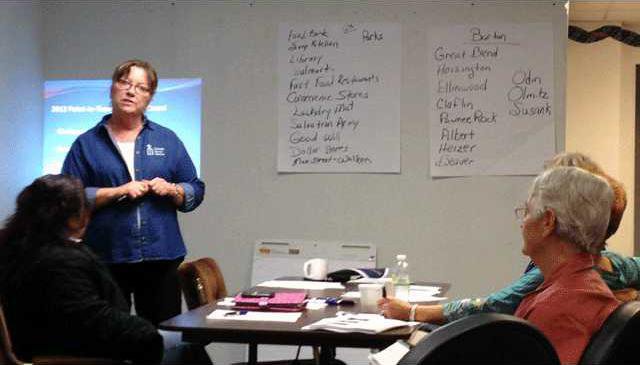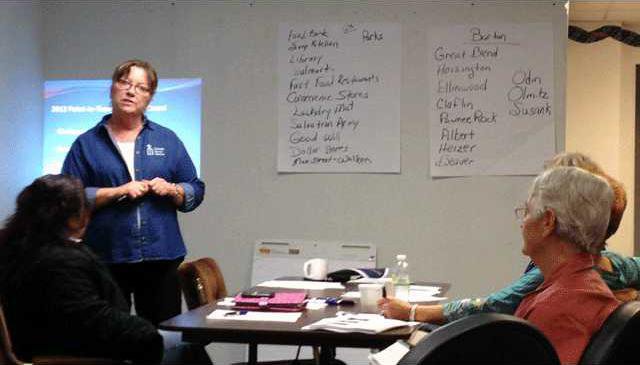They live in cars or trucks with all their belongings, parked along the road or in parking lots. They live in abandoned houses, mobile homes or other buildings. They live in campgrounds in rickety trailers or tents. Sometimes, they can only find the shelter of a bridge, overpass, or dumpster. And if they aren’t spending their days or nights working or going to school, they may be walking from place to place, resting in libraries, department stores, fast food restaurants and parks. They are the rural homeless.
Retirees and volunteers from several churches and social services organizations met Thursday morning at the offices of Catholic Social Services to undergo training for the Point in Time Survey scheduled to begin Jan. 24. They will make their best effort to count the homeless in Barton County during the last ten days of January. It’s part of an annual, nationwide, mandatory order by the Department of Housing and Urban Development to assure federal funds will be available for sheltering and improving services for the homeless.
Groups of two survey takers will visit known places where the homeless are likely to congregate and inquire where individuals spent the night on Jan. 23, which will provide a count of unsheltered homeless people on that one night.
“Safety is a top priority,” McGurk said. “We do not want to put anyone in danger.”
Those surveyed may answer only the questions they wish to, and will not be identified. Volunteers have been instructed only to ask for the birth date and the first, middle and last initials of individuals being surveyed. It is estimated the survey will take approximately five minutes to administer.
In addition to the number of homeless individuals, McGurk said questions are designed to help determine what events caused them to become homeless.
“ While many experience mental health, addiction issues, or criminal history, these aren’t the only causes,” she said. “Some experience domestic abuse, abandonment, or simply lose a job. Others may simply be part of the working poor.” At this time, in order to be able to afford a two bedroom house in Great Bend, a full-time wage of $10.38 an hour is required, McGurk said.
The survey will take place across the nation during the last ten days of January.
Homeless families
For families that find themselves homeless, staying together could be one of the biggest challenges faced.
“We’ve learned from counts like this that the fastest growing sector of the homeless is among families and single women with children,” Patty McGurk of Catholic Social Services said. “In Great Bend, we have no shelters for families, so families in need of shelter need to go to different housing, adding additional stress to an already stressful situation.”
In fact, many homeless families refuse to do this, she said. They may resort to living in vehicles or abandoned buildings and houses in order to stay together. In order to keep children from being taken into protective custody, they will try to hide their homelessness, McGurk said. If they don’t, there is a chance the children will be taken away and put in foster homes.
If the results from this survey indicate there is enough need, HUD could provide funding for shelters that aim to keep families intact.
Veterans and unaccompanied youth
Survey takers around the country will also be paying particular attention to homeless veterans and unaccompanied youth this year. Kansas has historically lower numbers of this segment of the homeless than other states, but it is unknown if this is simply because of a lack of data collected.
HUD requires this information as it continues to track progress towards reaching the goals and objectives of the federal strategic plan to prevent and end homelessness called Open Doors. The number of veterans experiencing homelessness has seen a recent decline thanks in part to the rapid rehousing arm of Open Doors, which provided funds needed to catch up overdue utilities and rents which made the difference between staying in a home or being on the streets.
Unaccompanied youth, on the other hand, are much more difficult to track, according to Child Trends Data Bank, a nonprofit, nonpartisan research organization, as often they “double up” or “couch surf” in order to find shelter. The unsheltered count is not focusing on this type of homelessness, but volunteers are still being asked to collect data if they happen upon it, McGurk said. Once collected, the data will be released to the public so faith-based and nonprofit groups can use it when determining the direction of outreach programs, she said.
Countywide effort
Surveys will not only be taken in Great Bend. Volunteers are being asked to conduct the survey in communities throughout the county. This includes the towns of Claflin, Ellinwood, Hoisington, Pawnee Rock, Albert, Heizer, Beaver, Dundee, Odin, Olmitz and Susank. Once the surveys are complete, Catholic Social Services will be in charge of reporting the results to HUD.
Preparing for a Point in Time





